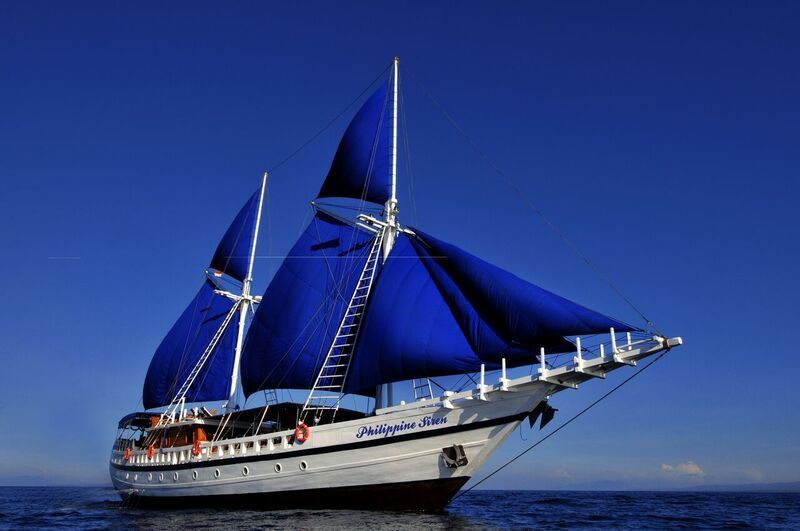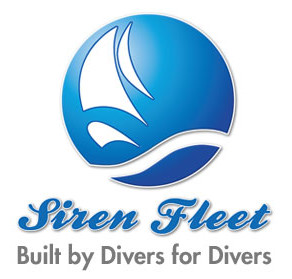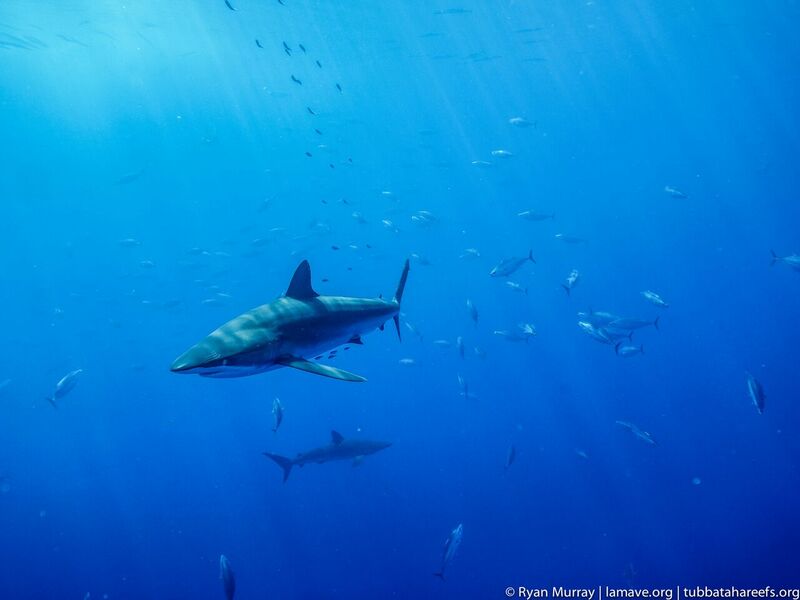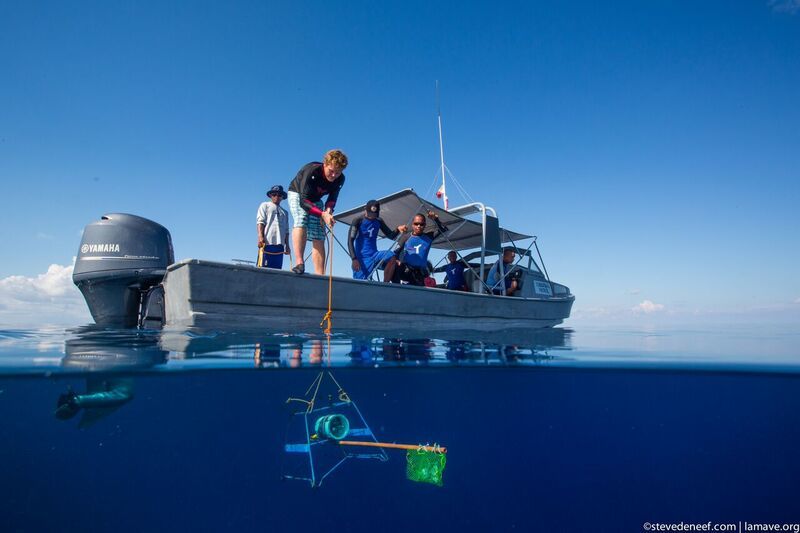Marine Life & Conservation
LAMAVE joins Philippine Siren in Tubbataha for a special Shark/Ray behaviour trip

 While the Tubbataha 2016 season is barely over, Siren Fleet are already looking forward to the coming season, which is already filling up swiftly. Check out this exciting event in spring 2017: hop on board the Philippine Siren on Siren Fleet’s 29 March – 4 April 2017 6-night cruise and get even more out of your Tubbataha liveaboard dive trip.
While the Tubbataha 2016 season is barely over, Siren Fleet are already looking forward to the coming season, which is already filling up swiftly. Check out this exciting event in spring 2017: hop on board the Philippine Siren on Siren Fleet’s 29 March – 4 April 2017 6-night cruise and get even more out of your Tubbataha liveaboard dive trip.
- Assist the LAMAVE team in monitoring tiger shark and gray reef shark behaviour.
- Join in for exploratory dives to deploy new acoustic receivers to track individual (whale) sharks, manta rays and analyse the gathered data from existing receivers.
- Help with identifying individual tagged species of (whale) sharks, manta rays and turtles to be able to count their numbers.
 LAMAVE – Large Marine Vertebrates Research Institute Philippines – is the largest independent non-profit non-governmental organisation dedicated to the conservation of marine megafauna and the protection of their habitats in the Philippines. They have been working with the Tubbataha Management Office and it’s rangers since 2015 to assess the biodiversity, shark/ray behaviour and study the whereabouts of shark/ray species in the Tubbataha Reefs Natural Park. You can find out more about LAMAVE at www.lamave.org.
LAMAVE – Large Marine Vertebrates Research Institute Philippines – is the largest independent non-profit non-governmental organisation dedicated to the conservation of marine megafauna and the protection of their habitats in the Philippines. They have been working with the Tubbataha Management Office and it’s rangers since 2015 to assess the biodiversity, shark/ray behaviour and study the whereabouts of shark/ray species in the Tubbataha Reefs Natural Park. You can find out more about LAMAVE at www.lamave.org.
One of the main goals of this expedition on the Philippine Siren is to retrieve and deploy acoustic monitoring stations, and download the data for the first time to see how tiger sharks and gray reef sharks use the North and South Atolls of Tubbataha Reefs.
Working in close collaboration with the park rangers, LAMAVE apply several research techniques to gather their data. The divers will be trained in these data collection methods, especially in Photo-Identification. This technique aims to identify single individual animals based on the distribution of the unique spots and stripes patterns on their body. Divers will be able to match each of their photos taken during the encounter with the national and international catalogue to learn more about the history of each individual mantas and whale sharks and directly contribute to the conservation of the species. The so called Citizen Science does not stop with whale sharks and mantas. LAMAVE, in collaboration with the Tubbataha Management Office, use divers’ photos and reports to assess the biodiversity of these amazing corners of paradise.
To date, LAMAVE’s research has shown the presence of 23 different species of sharks and rays within the park. Besides their research activities, an equally important part of their work is providing information, education and raising awareness. LAMAVE’s researchers visit local schools, offer film screenings, conduct community art projects and give lectures on plastic pollution, sustainability, coral reefs and (whale) sharks.
Whilst on board, Gonzalo Araujo, who is one of LAMAVE’s executive directors, will give several presentations on LAMAVE’s research. Gonzalo has been working in the Philippines since 2011 and joined LAMAVE in July 2012. Ever since, he has supervised whale shark research and conservation across different sites in the Philippines. He is interested in the movement and ecology of marine megafauna and how we can study them through minimally to non-invasive methods. This includes the use of lasers – photogrammetry, satellite and acoustic tags, remote cameras and new technologies involving DNA. Understanding a species presence and whereabouts is essential to advise the authorities and ensure their conservation.
Worldwide Dive & Sail embraces LAMAVE’s work and objectives and will donate a portion of all income of this cruise to them. So sign up for this special cruise, in order for you to participate and contribute in multiple ways to help this NGO continue their valuable work. Contact the Worldwide Dive and Sail team today at philippines@wwdas.com for more information and bookings.
Marine Life & Conservation
Paul Watson Released as Denmark Blocks Japan’s Extradition Bid

Renowned anti-whaling activist Paul Watson has been released from custody in Greenland after spending five months in detention. Denmark’s Justice Ministry rejected Japan’s request for his extradition, citing insufficient guarantees that his time already served in custody would be credited against any potential sentence.
The 74-year-old Canadian-American was arrested on July 21 in Nuuk, Greenland’s capital, when his ship docked to refuel. His arrest was based on a 2012 Japanese warrant related to a 2010 encounter in Antarctic waters. Japan alleged Watson obstructed operations and caused damage to a whaling research ship during efforts to disrupt illegal whaling. Watson has consistently denied these claims, maintaining his commitment to marine conservation.
Denmark, which oversees extradition matters for Greenland, concluded that while the legal conditions for extradition were met, the lack of assurances from Japan regarding time-served credit made extradition untenable.
In a video shared by his foundation, Watson expressed gratitude and relief, saying, “After five months, it’s good to be out… and good to know they’re not sending me to Japan.” He added that the most difficult part of his time in custody was being separated from his two young sons.
Watson is a pioneering figure in marine conservation, known for founding the Captain Paul Watson Foundation in 2022 after decades of activism with the Sea Shepherd Conservation Society. His bold efforts to defend marine life have earned him widespread support, including from celebrities and conservationists. His work has also been featured in the acclaimed reality TV series Whale Wars.
Watson’s lawyer, Jonas Christoffersen, praised the decision, stating, “We are happy and relieved that Paul Watson is now free.” He added that Watson is eager to reunite with his family and continue his vital work.
The arrest occurred while Watson’s vessel, the M/Y John Paul DeJoria, was en route to the North Pacific with a team of 26 volunteers to intercept a Japanese whaling ship. His foundation described the arrest as politically motivated and emphasized that Watson’s actions were focused on ending illegal whaling practices.
Japan resumed commercial whaling in 2019 after leaving the International Whaling Commission, asserting that whale meat is a cultural tradition. Conservationists, however, continue to challenge these practices, highlighting their impact on marine ecosystems.
Despite the challenges, Watson remains steadfast in his mission to protect marine life and bring attention to whaling practices. His dedication to ocean conservation has made him a globally respected advocate for the environment.
Marine Life & Conservation
12 Days of Zero-Waste Fish-mas

This holiday period, the Marine Conservation Society, the UK’s leading ocean membership charity, invites you to make some simple changes to eating fish this Christmas to help our seas.
Dr Kenneth Bodles, Head of Fisheries and Aquaculture at the Marine Conservation Society, said, “During the festive season, our consumption increases, but so does waste. Sustainability isn’t just about where food comes from – it’s also about how you use it. By reducing waste and making the most out of your seafood, you’re not only taking steps to be more ocean-friendly, but can also help to cut costs during what is often one of the most expensive times of the year”.
The Marine Conservation Society has compiled twelve tips on how to consume seafood sustainably with zero-waste this Christmas:
Buy whole fish instead of fillets
Instead of fillets, consider buying whole fish such as salmon, hake, or lemon sole. By adopting a “nose to tail” approach with cooking, whole-baked fish not only feeds a crowd, but also helps to minimise waste and maximise sustainability by using up every part of the animal, including bones, skin, and fat.
Make fish stock
Leftover fish bones or shells can be put to good use by boiling them to make a nourishing fish stock or bisque. This can be frozen and preserved for later use and makes for a flavourful base in a soup.
Make your own fish pâté
Avoid waste by turning leftover fish, such as smoked mackerel or salmon, into a delicious pâté by blending with cream cheese and lemon. Perfect when paired with crackers.
The sustainability of salmon and mackerel varies depending on where and how it is caught or farmed. For more information on green-rated options, check the charity’s Good Fish Guide.
Buy frozen
By purchasing seafood that is frozen or vacuum-packed, this helps to reduce waste by extending the shelf life of your food.
Fish pie
If you’re wondering what to do with leftover cooked fish, why not opt for a classic fish pie with mashed potatoes, leeks, and a cheesy sauce? A sure crowd pleaser on Boxing Day.
Use the head
Don’t forget the fish head! The meat is incredibly tender and flavourful. The charity recommends a cod’s head curry or recreating Fallow’s renowned cod’s head in siracha butter.
By stretching your ingredients further, not only is this a more sustainable way to enjoy seafood, but also cost-effective by repurposing leftovers and cooking creatively.
Boxing Day brunch
Mix leftover kippers or smoked salmon with scrambled eggs for a tasty, zero-waste, Boxing Day brunch.
For best choice, make sure you buy kippers, or herring, from the North Sea and the North Irish Sea.
Zero-waste storage
A top tip from the Marine Conservation Society to avoid waste is freezing fish offcuts to save for future use.
Crisp up the skin
Even leftover fish skin can be turned into a quick savoury snack by crisping it up in an air fryer with a little olive oil and salt.
Anchovies two ways
Leftover anchovies can either be blended with butter to make a delicious anchovy butter or tossed into pasta for a hit of umami flavour.
The charity recommends opting for anchovies caught in the Bay of Biscay for best choice.
Fishcakes
For an easy, zero-waste meal, leftover seafood trimmings can be mixed with mash and fried in breadcrumbs to make fishcakes.
Pickled mussels
Try pickling mussels in 1:1 vinegar and water, with a dash of sugar for a sustainable, zero-waste snack that can be enjoyed well beyond the festive season.
Mussels farmed in the UK are a seafood superhero. Grown using low-impact methods and harvested by hand, they get all the food they need from the sea around them. This makes them one of the most sustainable, ocean-friendly, and cost-effective seafood options.
Players of People’s Postcode Lottery have raised £6.6M towards the Marine Conservation Society’s vital work in making seafood more sustainable.
Laura Chow, Head of Charities at People’s Postcode Lottery, said: “Fish is a festive favourite for many, but making sustainable choices when it comes to how we buy and eat seafood makes all the difference for our ocean. Support from players of People’s Postcode Lottery has helped the Marine Conservation Society further its sustainable seafood work, so that we can all enjoy healthier, better protected seas.”
The Marine Conservation Society encourages you to make sustainable seafood choices a year-round habit, not just for Christmas. To check how sustainable the seafood on your plate is, you can visit the charity’s Good Fish Guide. The Guide helps consumers and businesses identify the most sustainable seafood using a simple traffic light system, based on where and how species are caught or farmed. Green is the best choice, amber means improvements are needed, and red indicates fish to avoid buying.
Zero-waste gift idea
Why not embrace a zero-waste Christmas by gifting a membership to support marine conservation? It’s a meaningful, low-waste gift that helps protect our ocean for generations to come. Memberships start from as little as £5 a month – the price of a sandwich and drink from your local coffee shop.
Find the latest sustainable seafood advice for wild-caught and farmed seafood on the Good Fish Guide, downloadable to your phone from www.mcsuk.org/goodfishguide.
-

 News2 months ago
News2 months agoIconic SS United States to become the World’s Largest Artificial Reef
-

 News3 months ago
News3 months agoBook Review – 52 Assignments: Underwater Photography
-

 Gear News3 months ago
Gear News3 months agoDYNAMICNORD – New German diving brand enters the British market
-

 News3 months ago
News3 months agoExploring Cenote El Pit: A Diver’s Dream
-

 Gear News3 months ago
Gear News3 months agoTry BARE drysuits (and maybe even win one!) this Friday with Sea & Sea at North West Dive Fest
-

 Marine Life & Conservation3 months ago
Marine Life & Conservation3 months agoBook Review: Coral Triangle Cameos
-

 Blogs2 months ago
Blogs2 months agoDive the Egyptian Red Sea this Autumn with Regaldive
-

 News3 months ago
News3 months ago2024 Ocean Art Underwater Photo Competition Announced






